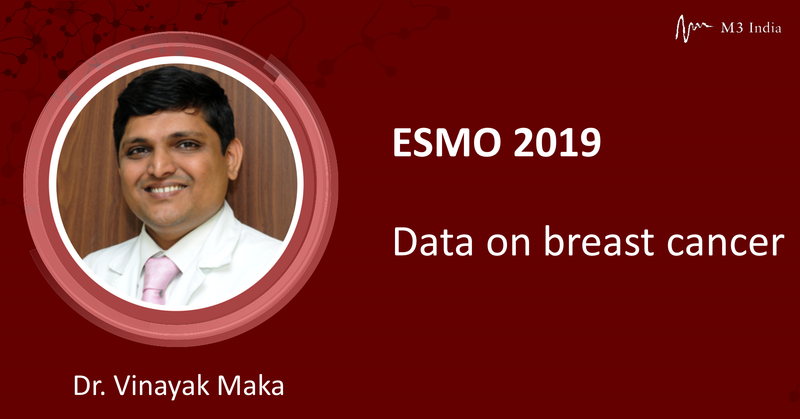Practice-changing trials in breast cancer from ESMO 2019: Dr. Vinayak Maka
M3 India Newsdesk Oct 04, 2019
The European Society of Medical Oncology (ESMO) Annual Congress 2019 was from September 27 to October 1 at Barcelona, Spain, featuring about 3,904 submitted abstracts which were on potentially practice-changing trial results in various cancers with the ever-expanding role of immunotherapies and developments in precision medicine. Here, Dr. Vinayak Maka explains what these trial results in breast cancer mean for Indian oncologists.

CDK 4/6 Inhibitors Boost OS in HR-positive, HER2-negative Advanced Breast Cancer
Maturing clinical trials data indicated that treatment with CDK 4/6 inhibitors offer a survival advantage to women with advanced breast cancer.
MONARCH-2
In the trial, women treated with Abemaciclib plus Fulvestrant achieved a median overall survival (OS) of 46.7 months compared with 37.3 months among women treated with placebo and fulvestrant (P=0.0137) in patients with HR-positive, HER2-negative advance breast cancer who progressed on prior endocrine therapy. The OS benefit was consistent in all stratification factors, although more pronounced effects were observed in subgroups of visceral disease (HR 0.675) and primary resistance to prior endocrine therapy (HR 0.686).
Patients taking Abemaciclib achieved a median 50.2 months before requiring chemotherapy versus 22.1 months among people taking placebo-fulvestrant alone (P<0.0001). Treatment with Abemaciclib was tied to a longer time to chemotherapy, which was important to patients. More than 50-month delay to chemotherapy is "a game-changer.
There were, however, a number of unanswered questions, including the rates and duration of grade 2 diarrhea, and whether that side effect affected patients' quality of life.
MONALEESA-3
In a second study presented at ESMO, a statistically significant OS prolongation was achieved with Ribociclib plus fulvestrant versus placebo plus fulvestrant in women with advanced HR-positive/HER2-negative disease. In the MONALEESA-3 trial, patients in the Ribociclib-Fulvestrant arm had not reached a median survival after a median of 42 months of treatment. Women who received placebo-fulvestrant had a median OS of 40 months (P=0.00455).
Data demonstrates a consistent, meaningful prolongation of survival with Ribociclib with multiple endocrine therapy partners, regardless of menopausal status. This is not only statistically significant, but it is also clinically meaningful. Per protocol, these OS results will be considered final as these results have crossed prespecified Lan-DeMets stopping boundary for superior efficacy
The two studies included different patient populations as well as different CDK4/6 inhibitors used as different lines of therapy. The results give the treating physician the full spectrum of choice of CDK4/6 inhibitor for each individual patient, although the two CDK4/6 inhibitors have slightly different management requirements and toxicity profiles.
Inhibition of CDK4 and CDK6 Offers Hope in HR+/HER2+Breast Cancer
monarcHER
Abemaciclib showed benefits in a broader group of breast cancer patients beyond its current indication in HR-positive/HER2-negative advanced disease. In the randomised, phase II monarcHER trial, progression-free survival (PFS) was superior among postmenopausal women with HR-positive/HER2-positive locally-advanced or metastatic breast cancer treated with Abemaciclib plus trastuzumab plus fulvestrant versus trastuzumab plus standard-of-care chemotherapy of the investigators' choice. monarcHER is a well-designed, hypothesis-generating trial that addresses clinically relevant questions including whether CKD4/CKD6 inhibition now has broader application in patients with HR+/HER2+ advanced breast cancer.
Adding Atezolizumab May Improve Outcomes in HER2+ Breast Cancer with PD-L1 Expression
Phase II KATE2
A numerical improvement in overall survival (OS) was realised with the addition of Atezolizumab to ado-trastuzumab emtansine (T-DM1) compared with T-DM1 alone in a second planned OS analysis of the phase II KATE2 trial, which was conducted in patients with previously treated HER2+ advanced breast cancer with PD-L1 expression in immune cells, with a 1-year survival rate of 94%, compared with 88% in the patients randomised to T-DM1 without Atezolizumab. The biggest difference between the placebo and Atezolizumab arm relates to stromal TILs, with high levels predicting benefit with the addition of Atezolizumab to T-DM1.
Immune therapy eliminates tumour cells in early Triple Negative Breast Cancer
Triple negative breast cancer is the most aggressive subtype of breast cancer and more often affects young women. Patients typically receive chemotherapy, followed by surgery to remove the tumour. This provides the best chance of pathological complete response, meaning no cancerous cells remaining on the resected tumour. Women with a pathological complete response have an 85–90% likelihood of being cured, while those with residual viable tumour tissue have a 40–50% probability of recurrence, which often occurs within three years. Immune therapy added to chemotherapy improves pathological complete response in patients with early triple negative breast cancer.
The data suggests that the improved pathological complete response with pembrolizumab translates into fewer recurrences. While a large benefit in response rates was expected, the poor predictive value of PD-L1 was surprising. This is probably because most early stage triple negative breast cancers express some degree of PD-L1, sometimes below the predefined cut-off of positivity. The role of chemotherapy as a sensitiser for anti-PD-1 in PD-L1-low early stage triple negative breast cancer should also be explored.
Disclaimer- The views and opinions expressed in this article are those of the author's and do not necessarily reflect the official policy or position of M3 India.
Dr. Vinayak Maka is a Senior Medical Oncologist who teaches and practice at the MS Ramaiah Medical College and the HCG MSR Cancer Centre, Bangalore.
-
Exclusive Write-ups & Webinars by KOLs
-
Daily Quiz by specialty
-
Paid Market Research Surveys
-
Case discussions, News & Journals' summaries